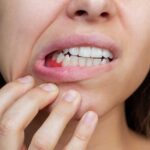Seeing blood in your mouth can be scary. Tooth Bleed is a common problem that can happen for many reasons. Sometimes it is minor, and sometimes it can be a warning sign. The good news is there are ways to manage it quickly and safely. In this article, you will learn why tooth bleeding happens, what you can do at home, and Dental Care Tips to prevent it in the future.
Why Does Your Tooth Start Bleeding?
Bleeding teeth or gums can occur when the soft tissue around your teeth gets irritated or injured. You might notice blood when brushing, flossing, or even eating.
Some everyday causes include:
- Brushing too hard with a stiff toothbrush.
- Flossing roughly or skipping flossing for a long time.
- Food stuck between teeth that pokes your gums.
- Vitamin deficiencies like C or K.
- Smoking or using tobacco products.
Most of these causes are not serious and can be fixed with proper care. However, persistent bleeding may be a sign of gum disease or infection.
When Tooth Bleeding Is a Sign of a Bigger Problem
If your gums are red, swollen, or painful along with bleeding, it could be gingivitis or periodontitis. These infections occur when bacteria build up and damage your gums and the bone supporting your teeth. Ignoring them can cause loose teeth or more severe dental issues.
A dentist can check whether the problem is minor or needs professional treatment. Early attention often prevents serious damage.
Quick Ways to Stop Tooth Bleeding at Home
You don’t have to panic when you notice bleeding. Gentle care at home can help reduce bleeding and promote healing.
Rinse Your Mouth with Warm Salt Water
Mix a teaspoon of salt in a cup of warm water and rinse your mouth. This helps reduce bacteria and swelling. It also soothes irritated gums and encourages healing.
Use a Soft-Bristle Toothbrush
Switch to a soft-bristled toothbrush if your gums bleed easily. Brush gently in circular motions to remove plaque without hurting the tissue. Avoid harsh scrubbing, as it can make bleeding worse.
Floss Carefully
Floss slowly and carefully to remove trapped food. Rough or sudden movements can injure your gums. Over time, regular gentle flossing helps your gums become stronger and less prone to bleeding.
Cold Compress for Swelling
If your gums are swollen, applying a cold compress outside your cheek for a few minutes can reduce inflammation and slow bleeding.
Avoid Irritating Foods and Drinks
Stay away from acidic, spicy, or hard foods while your gums are bleeding. Alcohol-based mouthwashes can also dry your mouth and worsen bleeding. Stick to gentle care until the bleeding stops.
Dental Care Tips to Prevent Future Tooth Bleeding
Prevention is better than treatment. Following simple Dental Care Tips can help protect your gums and teeth from bleeding in the future.
Brush Properly Twice a Day
Hold your brush at a 45-degree angle to your gums and use gentle circular motions. Brushing like this removes plaque without harming your gums. Replace your toothbrush every three months for best results.
Floss Daily
Flossing once a day helps remove plaque and food particles between teeth. Doing it gently ensures you don’t injure your gums and reduces the chances of bleeding over time.
Eat a Balanced Diet for Healthy Gums
Foods rich in calcium, vitamin C, and other nutrients strengthen your teeth and gums. Milk, cheese, leafy greens, and fruits like oranges help gums heal and stay strong. Drink plenty of water to wash away bacteria naturally.
Regular Dental Checkups
Visiting your dentist every six months helps catch problems early. Even if your gums feel fine, professional cleaning removes plaque and tartar that you can’t reach at home.
Avoid Tobacco Products
Smoking slows gum healing and increases the risk of infections. Quitting or reducing tobacco use can improve oral health significantly.
When to See a Dentist Immediately
Sometimes tooth bleeding is minor and resolves quickly. Other times, it signals a deeper issue. See a dentist if:
- Bleeding persists for more than a week.
- You notice swelling, pain, or bad breath.
- Your gums are receding or teeth feel loose.
- You have underlying medical conditions like diabetes that may affect gum health.
Early dental care can prevent serious complications and keep your teeth strong for life.
Final Thoughts
Tooth bleeding is common, but it should never be ignored. Most minor bleeding can be stopped quickly with gentle care at home. Following Dental Care Tips, maintaining proper brushing and flossing habits, and visiting your dentist regularly can prevent future problems.
Remember, healthy gums protect your teeth and improve your overall well-being. By paying attention to small signs like bleeding, you can maintain a confident smile without pain or discomfort.

